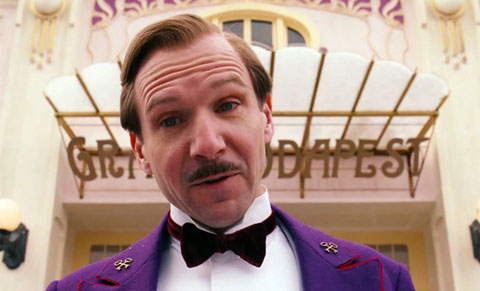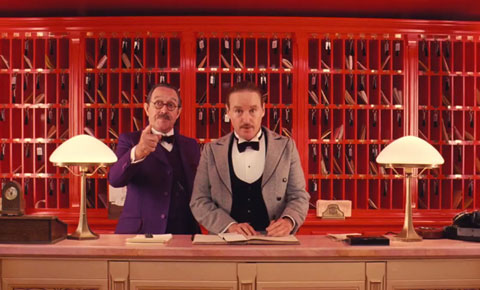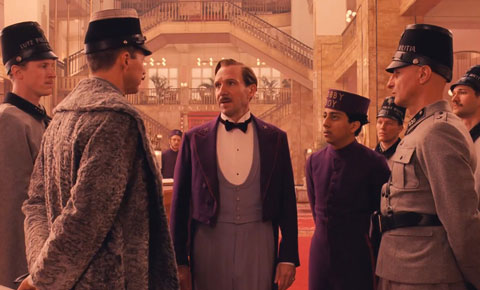Be swept away by The Grand Budapest Hotel
It's understandable why visionary extraordinaire Wes Anderson has the power as a filmmaker and storyteller to own this magical allure; his quirky style and unique way of telling a story created an immediate cult following with films like Rushmore, The Darjeeling Limited, The Life Aquatic With Steve Zissou, The Royal Tennenbaums and, most recently, Moonrise Kingdom.

Wes Anderson said his eighth feature film comes from a mix of inspirations including the pre-code comedies of the 1930s and the stories and memoirs of Viennese writer Stefan Zweig. His collection of inspirations ranged from a supremely charming close friend with a unique and wonderful way with words and a very special view of life, someone unlike anyone else Anderson knows in the world; he also toyed with the idea to make a kind of a European movie - inspired especially by Stefan Zweig, a writer who I've come to really love in the last several years; and then there were readings totally unrelated to Grand Budapest, like Hannah Arendt's "Eichmann in Jerusalem", as well as "Suite Française" by Irène Némirovsky, which he then mixed in his own unique style.
An extraordinary caper in constant motion
All of this results in an extraordinary caper in constant motion: kinetic and comic; a timeless tale of friendship, honour, and promises fulfilled, recounting the adventures of Gustave H, a legendary concierge at a famous European hotel between the wars, and Zero Moustafa, the lobby boy who becomes his most trusted friend.
At its core, the story involves the theft and recovery of a priceless Renaissance painting; a raging battle for an enormous family fortune; and the sweetest confection of a love affair - all against the backdrop of a suddenly and dramatically changing continent, but like Anderson's crazed mindscape, The Grand Budapest Hotel is a pleasant lucky packet for any cinema buff.

It is one of those rare films that draw you into an experience that is truthful, yet fabricated, and its constant war between reality and fantasy results in unequivocal entertainment that is meaningful and, ultimately, rewarding. Just like the guests who populated this one-of-a-kind hotel, so does the cinema-goer book into the experience and receive a personal five-star room service.
The main action of the story kicks off with the sudden and mysterious death of 84-year-old Dowager Countess Madame Céline Villeneuve Desgoffe und Taxis, a.k.a. Madame D.
Anderson wrote the part of Monsieur Gustave H, the fastidious concierge at the heart of the film, with one actor in mind: Ralph Fiennes, a two-time Oscar nominee for Schindler's List and The English Patient. "The idea that Ralph was going to play this character enriched it completely," said Dawson. Fiennes disappears into that persona and immerses himself fully into the character's many contradictions.
A who's who of actors
The films offers the who's who of actors; with Irish actress Saoirse Ronan as Agatha, a striking young apprentice at the famous bakery in Zubrowka; Adrien Brody, who previously starred in The Darjeeling Limited, is superb as the ruthless and darkly comic main villain; equally delightful is Willem Dafoe as a cold-hearted henchman named Jopling, a thug in a leather coat, brass knuckles and high-heeled boots; Jeff Goldblum is charming as Deputy Vilmos Kovacs an attorney; and Edward Norton is hilarious as Captain of the Lutz Military Police.

Totally unrecognisable is Tilda Swinton in the role of Madame D, spending almost five hours each morning in hair and make-up in preparation to play the 84-year-old widow. Playing the young Zero Moustafa, who rose from the ranks of junior lobby boy to become the proprietor of the Grand Budapest, is newcomer Tony Revolori; with F Murray Abraham, playing the older Moustafa who details the history of his character's rise to his current stature, and serves as the story's main narrator.
You cannot ask for anything more from a film like The Grand Budapest Hotel. It is delightful escapism that draws you into a vibrant experience that lives on long after leaving the cinema.
Even after a third viewing you are tempted to become a permanent resident, and will only then discover the fine detail that is spun delicate into its colourful fabric.
Behind the scenes
Six-time Academy Award nominee Alexandre Desplat developed one of his most unusual scores - one played entirely without traditional orchestral instruments. Instead, he brought in a host of Central European instruments, including balalaikas and the cimbalom, a type of hammered dulcimer common to Eastern European gypsy music. He flew in a 50-member balalaika orchestra from Moscow for the final recording.
Desplat says that Anderson fosters an atmosphere of experimentation. "We do things together that neither I as a professional composer nor he has ever done before," he muses. "I try to find the sound, the melodies, the rhythms that match what is onscreen, but are based on things we don't see: the past or the future of the character or their inner emotions. When I sit down with Wes, we explore all of that."
When production wrapped, Anderson dived into the cutting process with editor Barney Pilling. Pilling, whose films include Quartet and An Education, had not worked with Anderson previously but was intrigued by the task. "The Grand Budapest Hotel is a wonderful prism of storytelling," he comments. "It spans three different eras and is mostly set in a wondrous pre-war era that lends a dramatic context to everything. To me, it's also about the filmmaker's memories of classic movies of that time. And I was really struck by the scale of it, which is more epic and ambitious than Wes's previous movies, which made it doubly exciting."
Read more at www.writingstudio.co.za/page5006.html
























